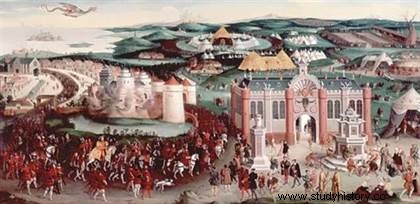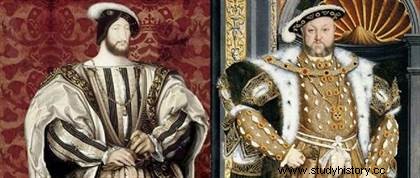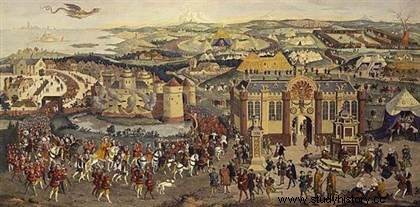 The Gold Cloth Camp , nicknamed the Bivouac de Luxe , is the scene of the meeting of two kings, on June 7, 1520:François Ier and Henri VIII. The King of France hoped to obtain the signing of a treaty of alliance there with the suspicious King of England, in order to counterbalance the new political situation born of the election of Charles V at the head of the Holy Roman Empire one year previously. The Camp du Cloth d'Or will have cost the trifle of two hundred thousand pounds to the State in festivities, but no treaty of alliance is signed and it is the Habsburg who still wins the game...
The Gold Cloth Camp , nicknamed the Bivouac de Luxe , is the scene of the meeting of two kings, on June 7, 1520:François Ier and Henri VIII. The King of France hoped to obtain the signing of a treaty of alliance there with the suspicious King of England, in order to counterbalance the new political situation born of the election of Charles V at the head of the Holy Roman Empire one year previously. The Camp du Cloth d'Or will have cost the trifle of two hundred thousand pounds to the State in festivities, but no treaty of alliance is signed and it is the Habsburg who still wins the game...
Why this meeting at the Cloth of Gold camp?
The elections of the new representative of the Holy Roman Empire, following the death of Maximilian I, are at the origin of the camp of the Cloth of Gold. Francis I and Charles of Habsburg, King of Spain are in "competition". An assembly of seven important personages (the archbishops of Cologne, Mainz, Treves, the king of Bohemia, the duke of Saxony, the count palatine of the Rhine and the margrave of Brandenburg) choose the new Germanic emperor, in principle according to the political interest of one or the other, but in reality according to the sums of money received from one and the other. Francis I spends three million ecus to get elected, but does not succeed. The King of Spain attaches the banker Jacob Fugger who raises more funds than the King of France. Thus on June 28, 1519, Charles of Habsburg became Emperor Charles V!
From that day on, the two characters will have a fierce hatred for each other, so Francis I must consolidate his alliances, especially with the King of England. He therefore invited him to a meeting in June 1520.
Preparing for the interview
 Near Calais, the King of France is going to receive the King of England:two rivalries, two excessive prides go to meet. In addition to the two kings, there will be three queens, princes and princesses, dukes and duchesses. Five thousand workers take part in the development work, two villages are built, about two thousand eight hundred tents are installed, covered with velvet or gold cloth, adorned with the arms of the future occupants and at the top of each is mounted a apple of 'or.
Near Calais, the King of France is going to receive the King of England:two rivalries, two excessive prides go to meet. In addition to the two kings, there will be three queens, princes and princesses, dukes and duchesses. Five thousand workers take part in the development work, two villages are built, about two thousand eight hundred tents are installed, covered with velvet or gold cloth, adorned with the arms of the future occupants and at the top of each is mounted a apple of 'or.
Henri VIII settles in Guînes (English territory) on June 4. He built a castle of wood and glass "the Crystal Palace", whose windows are trompe l'oeil, the palace has about ten thousand square meters, in the colors of the Tudors, gilding and two fountains of red wine .
François I takes up residence in Ardres (French territory). His tent is "as tall as the tallest known tower". Surmounted by a statue of Saint Michael slaying the dragon, it has four large rooms whose interior tapestries are in blue velvet, dotted with gold lilies. The exterior is decorated with a curled gold cloth.
The other tents, draped in silks from Tours, are attributed to Queens Claude of France and Catherine of Aragon, to great figures such as the Constable of Bourbon, Cardinal Thomas Wolsey, the Comtesse de Chateaubriand (mistress of François I).
The lords happy to participate in this meeting, ruin themselves and sell all their goods to build these tents and wear ceremonial clothes. Witnesses of the time report that "they carry their mills, their forests and their meadows on their shoulders"!
In this plain of Flanders, there are only embroidered banners and banners, entertainers, comedians who rehearse their shows, gentlemen of the kingdom passing ladies in full dress, all to the sound of horns and trumpets. Even ladies' dogs wear jeweled collars.
Camp du Drap d'Or, luxury bivouac
Henry VIII (twenty-nine years old) and Francis I (twenty-five years old) therefore met on June 7, 1520:each preceded by their Constable, mounted on large horses caparisoned with money, they meet at the sound of the cannon… at the same second! The future “protocol”! The King of France is dressed in white and shod in gold, the King of England dressed in silver and precious stones. Each is followed by their escorts made up of four hundred archers and four hundred men-at-arms.
 At a specific place, materialized by a spear, the two kings continue alone, greet each other, kiss, dismount and hug each other. Back on horseback, they join the tent planned for their first meeting, welcomed by their constables. After an hour of discussion, they leave arm in arm, bursting with frank laughter, to go to their respective tents.
At a specific place, materialized by a spear, the two kings continue alone, greet each other, kiss, dismount and hug each other. Back on horseback, they join the tent planned for their first meeting, welcomed by their constables. After an hour of discussion, they leave arm in arm, bursting with frank laughter, to go to their respective tents.
It's the beginning of a month of festivities, sumptuous meals (about two thousand sheep, seven hundred conger eels, fifty herons, four bushels of mustard, accompanied by wine from Malvasia, claret, Burgundy and Bordeaux wine; in forty-eight hours two hundred and forty-eight dishes are served), balls, shows, dances. On June 9, comes the time for tournaments and fights of all kinds. As the days passed, Francis I and Henry VIII realized that they had things in common:sport, art and women. The icing on the cake:they speak French.
They are "so well together" that François I will one morning rush into Henry VIII's tent...to be the first to hand him his shirt. At court, it is an honor to dress the King. But the good understanding will be spoiled:during a fight with bare hands, François Ier proposes to Henri "My brother, I want to fight with you"... and before Henri reacts, the King of France jumps on him and mastery! This gesture of superiority is not to Henry's taste, he will remember it... Then it's the archery competition... the winner is Henry VIII.
On June 23, Cardinal Wolsey (constable of King Henry VIII) celebrates mass, assisted by the papal legate and twenty French and English bishops, followed by a large lunch on the grass, tournaments and fights. The next day, the queens exchange gifts.
The disappointment of the King of France
On June 25, the English and the French leave each other, without any signed treaty. Within ten days, Henry VIII met his nephew Charles Quint at Gravelines. This one welcomes him modestly and takes care of his person perfectly. Henry VIII was hurt by the superiority of François I, his power, his charm, his largesse, he who does not have a third of what the King of France has, neither in money, nor in army, nor in quality. Charles V has won another victory!
So Francis I receives a vague promise of friendship. His mistress, the Countess of Châteaubriant had warned him “you must beware of this man. When his eyes look at you, they sometimes reflect a few glimmers of falsehood. It is a bitter failure for France, which will lead to the disaster of Pavia in February 1525 and the imprisonment of François I in Spain.
Find out more
- 1520 The Camp of the Cloth of Gold:The Meeting of Henry VIII and François I, by Charles Giry-Deloison. Somogy, 2012.
